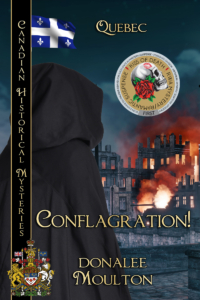The trial and tribulations of researching life – and death – in 1734
 My second mystery novel, Conflagration!, is my first historical mystery. My publisher has a series of historical mysteries than span Canada from coast to coast. When she unexpectedly lost her Quebec writer, she offered me the opportunity to write the book and step back to 1734 when the colony of New France was ruled by King Louis XV. It was an opportunity I embraced. With trepidation.
My second mystery novel, Conflagration!, is my first historical mystery. My publisher has a series of historical mysteries than span Canada from coast to coast. When she unexpectedly lost her Quebec writer, she offered me the opportunity to write the book and step back to 1734 when the colony of New France was ruled by King Louis XV. It was an opportunity I embraced. With trepidation.
At readings and book clubs, I joke that I am not from Quebec, I do not speak French as more than 80% of Quebecers do, and I do not write historical mysteries. So, of course, I said “yes” when my publisher offered me the opportunity to write Conflagration!. I am grateful I did.
What scared me most about the writing the book was getting something wrong. Misspeaking. Misunderstanding. Misconstruing. The foundation for Conflagration! (and for all historical mysteries) is accuracy. As a freelance journalist, I am used to writing on topics that I knew little (and somethings nothing) about. I have written articles on everything from buying cyber insurance to surviving a helicopter crash to paying the tooth fairy. I know how to research, how to interview people, how to find people to interview, and how to find accurate sources of information. For the most part though, the research I’ve done was contemporary or contemporary adjacent. It wasn’t from 300 years ago.
Conflagration! chronicles the arrest, trial, and subsequent execution of Marie-Joseph Angélique, an enslaved Black woman accused of setting the lower town of Montreal on fire. When the flames were finally squelched, forty-six homes and buildings were gone. The quarter, where the merchants lived and ran their businesses, was destroyed. Fortunately, no one died.
I had never heard of Angélique, had never read her story in the many history classes I took throughout school and university. I was not alone in this lack of knowledge. That is because Angélique’s story is also the story of slavery in Canada, and for centuries we have avoided the topic or rewritten the facts to shape the narrative. Fortunately,
Angélique’s story is more well known in Quebec, where a plaque has been erected in her memory in Old Montreal.
As I delved into the events of April 10, 1734, I discovered others had gone before me. There were books, websites, articles, documentaries, shorts. I embraced them all. Some of these sources also referenced court documents, meticulously recorded, albeit in French. One site translated those documents although translations from old French to modern English are not always clear and understandable. The golden rule in journalism is you must have at least two sources before you use any information. I also embraced this rule.
As nerve-wracking as ensuring my story accurately referenced the trial transcripts and sequence of events from the first flames to Angélique’s final breath, I discovered that the justice system was only one element of research required. At one point, I had my main character Philippe Archambeau, a court clerk assigned specifically to document Angélique’s case, get up early and make himself a cup of coffee. Then I asked myself, “Did they drink coffee in New France in 1734?” (They did, but tea was more common.)
This issue of everyday life came up in a myriad of ways. Philippe goes to put on boots. (Did they wear boots three hundred years ago? What kind?) His wife, Madeleine, is making supper. (How do you make supper when there are no stoves, no ovens, no electricity? What do you eat?)
The answers to these and a multitude of other questions were answered thanks to reliable sources on the internet, books written by authoritative sources, individuals knowledgeable about aspects of the story, the time, the history – and more.
I owe them all a debt of gratitude.


Finding your post interesting, since I’m embarking on a historical novel of my own. Thanks for sharing.
Good luck!
Anachronisms abound in historical fiction. It’s refreshing to see one so meticulously researched. Best of luck with the book, donalee!
At least my nerves have quieted down.
What a fantastic challenge! I love your 2 sources philosophy and your willingness to dive into the project!
Two sources was standard in journalism — and now it’s proving beneficial for historical fiction.
1gy4fe
Impressed by your accuracy and your efforts to be so accurate. The book sounds fascinating.
Thank you. The book was also fun to write, which is also important.
I, too am deep into research for a historical novel that first caught my imagination over ten years ago. The original sources are in languages I don’t speak, from a time when not too many people knew how to read, much less write. But the story won’t let my mind rest. I’m desperate to get things right, which is why it’s taken up so much time. How brave you are to push your project through, donnalee. Wishing you much success with it!
The issue of translation is a tricky one. The original court documents that are at the heart of Conflagration! are in French, and old French at that. Fortunately several reputable sites have translated the documents, and I am surrounded by French people who helped me decipher the information. Still nerve wracking.
What a great post about research! I can relate to the fear of getting something wrong… Can’t wait to read the book!!
Would love to hear your feedback.
Well, I’m Canadian. And I love historical mysteries. And I know from having read your work (and published your story) that you’re a helluva writer. So I looked it up on Amazon and Goodreads. Fantastic reviews. Winner, winner, chicken dinner. So I just ordered the paperback and eagerly await. Btw, I did know you’d written this, but never looked beyond the title — which I didn’t like (sorry, I have a real thing about exclamation marks in storytelling as anyone I’ve edited with tell you) and so seeing it in the title put me off — but I’m over it. Sharing the post, too.
Thanks Judy. I was surprised to discover how tricky the word “conflagration” can be, even without the exclamation mark, but it sounded very eighteenth century.
I’ve already blown up my monthly budget for buying books but what the hell. How did I get through school and not learn anything about slavery in Canada?
Great article donalee.
This is one of the things that shocked me and many others about this story. How did we not learn about slavery and Canada in school. Well, sadly we know the answer. On a positive note, Canada Post issued a stamp this year in honour of Angelique and Montreal has a plaque in the old town in recognition of her and addressing the role of slavery in this country.
Fascinating. Did you by chance consult French linguists to translate some of the articles you read? Painstaking research, donalee.
I reached out to everyone French I knew, and I had expert translations available online because of the signficance of this court case. There is also something about one of the characters’ names that relates to this question. I’ll leave that for you all to figure out.
emuzjh